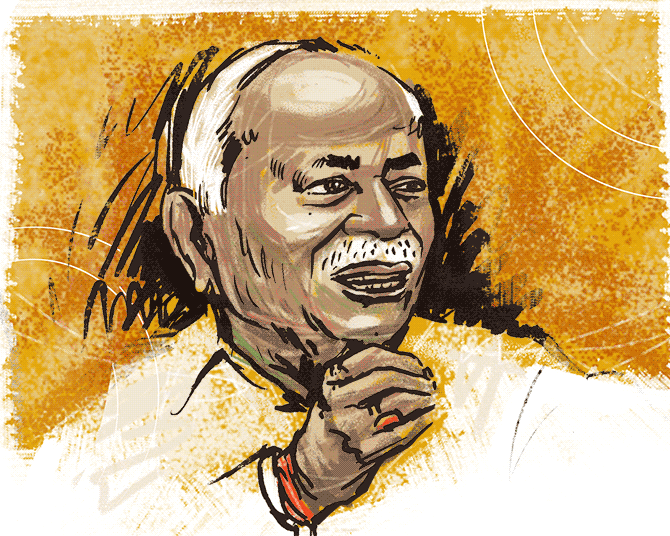 | « Back to article | Print this article |
'My passion remains pushing for probity in public life and I shall continue my fight,' S N Shukla tells Virendra Singh Rawat.
Illustration: Dominic Xavier/Rediff.com

The wiry frame and cheerful disposition of septuagenarian S N Shukla mask his firm resolve of while taking on the high and mighty of Indian politics and pushing for electoral and political reforms through the judiciary.
The man, who fought for disenfranchising former Uttar Pradesh chief ministers of government accommodation, lives in Nirala Nagar, a quiet residential enclave in Lucknow's trans-Gomti area.
It is because of Shukla's petition in the Supreme Court that the A-list UP politicians were forced to vacate their palatial government bungalows situated 5 km apart on the opposite side of the Gomti!
The evicted leaders, many of whom are self-appointed messiahs of the less privileged, had latched on to such accommodation for years together.
Eventually, they did check out but not before resorting to deferring tactics, including approaching the Supreme Court and offering lame excuses of not owning alternative residence or calling their premises memorials.
Shukla, who has retired from the Indian Administrative Service, is general secretary of Lok Prahari, on whose petition the apex court had on May 7 quashed a provision in the UP Ministers (Salaries, Allowances and Miscellaneous Provisions) Act, 1981, which entitled former chief ministers to official accommodation.
Disposing of the almost 13-year-old petition, the two-judge Bench of Justice Ranjan Gogoi and Justice R Bhanumathi had observed chief ministers were 'at par with the common citizen' once they demit office and allowing them to retain bungalows at public expense amounted to creating 'a separate class of citizens'.
Following the Supreme Court directive and facing immediate eviction from their bungalows in the high-security and posh Vikramaditya Marg arcade, Samajwadi Party patriarch Mulayam Singh Yadav had sought time and even offered to pay rent at market rates until he found a suitable accommodation.
He had also met UP Chief Minister Ajay Singh Bisht, who, however, was non-committal on this since the eviction directive had come from the apex court.
Yadav's son and SP President Akhilesh Yadav had also written to the UP estate department, seeking two years to vacate his adjacent bungalow, claiming he did not own a house in Lucknow and, owing to his elaborate security, he needed spacious accommodation.
The father-son duo also filed separate petitions in the Supreme Court when the Bisht government did not offer succour.
Mulayam, Akhilesh, Union Home Minister Rajnath Singh, Rajasthan Governor Kalyan Singh and Bahujan Samaj Party chief Mayawati vacated their houses before the deadline of June 3.
Earlier, the Supreme Court had in August 2016, while upholding the legal stipulation of allowing 15 days to vacate their premises after demitting office, ruled that former CMs were not entitled to government accommodation.
However, the Akhilesh Yadav government had introduced a Bill, adding another clause to the Act, entitling former chief ministers to official premises.
Lok Prahari then challenged the clause, claiming it violated Section 14 of the Act.
The Supreme Court had also issued notices to the Centre and other states. Later the observation on eviction was passed in reference to UP only as mentioned in the original petition.
"However, the Supreme Court ruling can be cited elsewhere and some organisations in other states have become active and are in the process of approaching court, seeking similar rulings," Shukla said.
His organisation, comprising 18 core members, had spent nearly Rs 50,000 on fighting the case, Shukla said, which had successfully got government accommodations worth billions of rupees in market value vacated.
Lok Prahari functions through contribution by members and does not seek donations, he said.
Shukla is pushing for more path-breaking reforms, seeking an Indian Judicial Service and disqualifying politicians who have been debarred from contesting polls from holding high office in political parties.
"We filed the petition for creating an Indian Judicial Service last year, although it is yet to be taken up. But we are optimistic," he said.
Shukla, who hails from Jalaun district in UP, studied law at Agra University before he entered the Indian Revenue Service in 1966, and served in the income-tax department. He, however, persevered and in the following year, 1967, ot into the IAS.
After retirement in 2003, he enrolled as a lawyer to pursue his reforms agenda.
Lok Prahari had filed a petition in the Supreme Court, seeking direction to make election contestants declare their and their spouses' sources of income.
Earlier, the candidates were required to declare their assets. The petition was allowed in February 2018.
The mild-mannered Shukla devotes four or five hours daily to Lok Prahari.
"I do not have any special interests or hobbies. My passion remains pushing for probity in public life and I shall continue my fight."